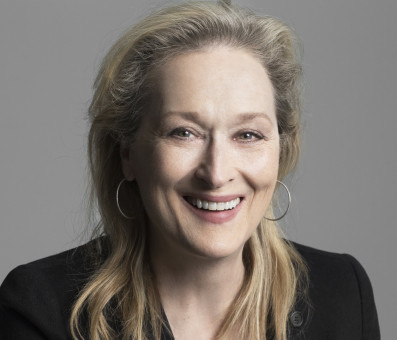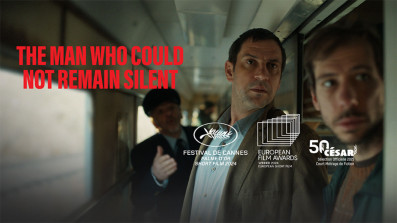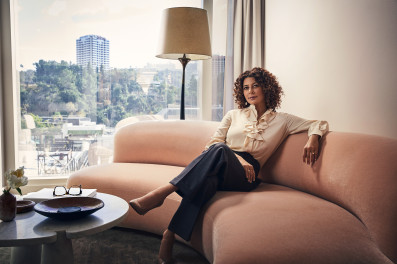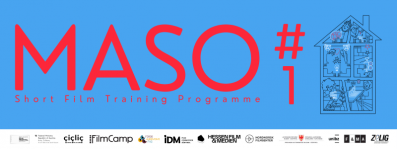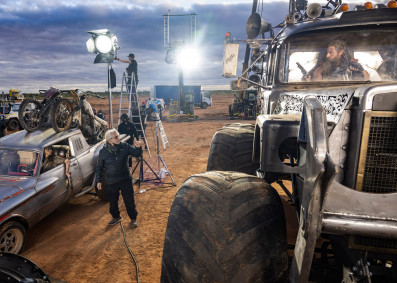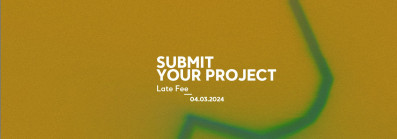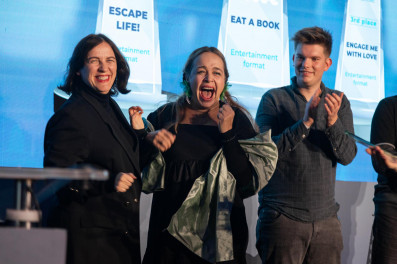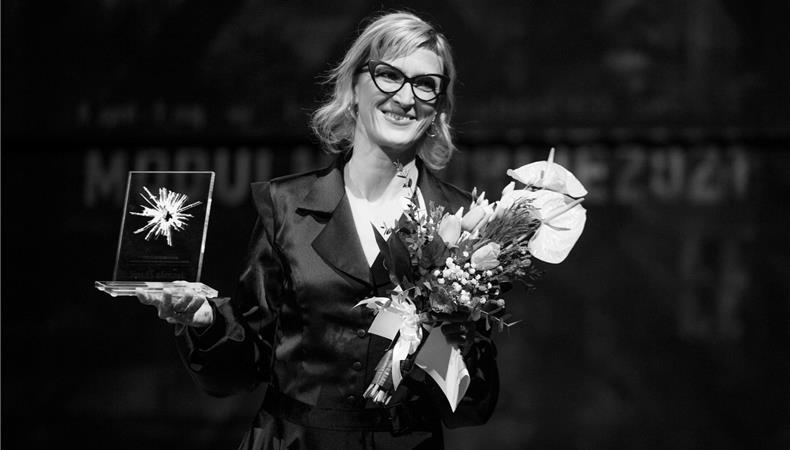
Interview with director Jasmila Žbanić: The nation is a bigger fiction than any feature film
Children have the opportunity to open their eyes, face reality and move on because young people should not bear the guilt or victimization of their parents.
Jasmila Žbanić is a Bosnian-Herzegovinian director and founder of the Deblokada Association of Artists. Her films have been screened at film festivals and exhibitions around the world and have repeatedly spoken over and over again about the traumas, stereotypes and scars of our societies. Her latest film Quo vadis, Aida? was selected for screening in the main competition program of the 77th Venice Film Festival. It was nominated for Best Foreign Language Film outside the English-speaking world at the 93rd Academy Awards. He won the Audience Award at the 50th edition of the Rotterdam International Film Festival and the Best Foreign Film Award in 2021 at the Gothenburg Film Festival. It was also nominated for Best International Film at the 36th Independent Spirit Award and for Best Foreign Film and Directing at the 74th BAFTA Award.
How is it even possible to make a film in the Balkans? How are you, Aida? the project was realized with dizzying figures, completely unreal for our film industry; budget of about 4 million euros, several thousand extras, a large number of co-producers…
We have invested a lot of energy, experience and knowledge in 5 years of work. It could have been shorter to have a greater understanding of what films mean to society, especially films like this. I think there are still a lot of untold stories that can help us become a better society. However, right at this moment, while we are talking, the budget for film production has been drastically reduced. It is as if with every success of a BiH author, the government decides to punish cinema even more.
Where in the film does documentary end and fiction begin?
In the research, both for this and for all the other films I have made, there comes a moment when reading documents, talking to witnesses and checking facts - is over because after that comes to a creative process in which I shape what I have learned and learned into a feature film. . A feature film does not have to follow the facts, but for this type of film, I found it important to be based on as precise facts as possible.
Have you made a film that will understand the world, but also the societies that emerged from the disintegration of Yugoslavia? Did you do it with that intent? For me, brought up in a narrative that does not admit that genocide took place in Srebrenica, the film was a liberating experience, something that united my thoughts and feelings.
You sent me an email telling me that you could cry on film in spite of everything. For me, it’s the biggest reward that people who come from different narratives can understand each other. It is also important to me that people who have never heard of Srebrenica say that they could have identified with some Aida there in a war they know nothing about. This means that humanity transcends all differences and art makes that bridge possible. That makes me terribly happy!
After the distribution of the film in Serbia began, was the impression of the reception of the local mainstream on the film missing and what are the criticisms?
I think there are a lot of people in Serbia who love and support the film. I received a lot of beautiful messages from colleagues, friends, relatives and strangers. I received this message a few days ago:
"Jasmila, first of all, I hope you are well. I'm not sure you'll read this, but I had to share my impression with you after watching the film. For a long time, nothing moved me like Aida. An extraordinary achievement that "pulls you in" and leaves an impression that you can't get away with for days. The impression lasts. It is both pain and shame and bitterness and anger. Thank you for the great step you have taken. I am sure that this film will be the key to changing the collective perception of the past in this area. I send you a lot of greetings from Serbia and I support Aida. "
These messages give me strength, I think then everything makes sense.
In his last play Srebrenica. When we are killed, director Zlatko Paković says that we should talk in Sarajevo about the issue of Srebrenica, for which Serb elites have prepared massacres and Bosniaks poverty. Are we ready to talk about Srebrenica in that way today? Your film doesn't end in July 1995?
Zlatko is right. I have been to Srebrenica on several occasions. I also did a film workshop with the children "Furaj svoj film" - we stayed there for 2 weeks and met the families. A lot of the kids who came to our workshop every day were poor, even hungry. It was a devastating experience for me. So many millions came "to Srebrenica", and never reached the citizens.
You managed to avoid propaganda and a one-dimensional pamphlet while maintaining a clear political thesis. This is a characteristic of your previous films as well: Grbavica, Na putu, For those who can't speak. You are always on the right side, but subtly, not lobotomizing the viewer. How do you get it all weighed and balanced?
I have respect for the viewer. I think people can draw their own conclusions. Before filming, I do long research because I am interested in what is true. And I think people feel that.
With how much responsibility do you access your stories? Is there fear and from what?
There is a responsibility to check everything well and to tell the truth, and I know that a lot of people get angry when they hear the truth and so even if I knew that because of some movie people would get mad at me, I would still talk about it. When we started working "On the Road", the media reported that some Wahhabi had threatened to kill me. That day we were to go to the mosque on Alipašin, where the Wahhabis were gathering at the time. Many people, foreign embassies called me to ask if I needed protection. Although I am not naive and I see what is happening in the world, I did not hesitate for a moment and my colleagues and I decided to continue and we made a film.
Speaking of previous films, I can't help but notice that you have a permanent team of your actors, who carry your stories: Jasna Đuričić, Ermin Bravo, Leon Lučev… How much do you all grow together during each project?
I choose actors because of the roles I believe he or she can best perform, I never choose actors because I am friends with them. I am friends with many actors and we talk a lot about our work, we study, we go to joint workshops. I share the same artistic and human worldview with many of them and it’s wonderful when people recognize themselves and when you don’t have to explain a lot to them but understand everything.
It is very interesting a kind of identity inversion in the film, where you assign Emir Hadžihafizbegović the role of a Serbian aggressor / cruel Serbian soldier, and Jasna Đuričić is Aida. Is it the hope for a new tomorrow and the deconstruction of identities, based on violence?
It doesn't matter to the film - and in my opinion it shouldn't matter to anything - what the fictionalized framework you're in is called, which is called a nation. A nation is a bigger fiction than any feature film. I really didn't choose any actor because of her or his nationality. If Jasna was Croatian, she would be Aida. That she is a Bosniak too. If Boris Isaković was not a Serb, he would also play Mladic because he is the best actor for that role.
Viktor Ivančić, Nemanja Stjepanović and the late Hrvoje Polan worked on the monograph Behind Seven Camps, where they told stories about cultural centres that became slaughterhouses and camps, and you take us to a children's play in the film, after the prisoners were huddled in a cultural centre. the kids on stage dance confusedly and close their eyes. We see such a scene earlier in the film, at the celebration of the New Year in 1992, with the protagonists being open, happy and dancing. If those generations were ready to prepare for the last war, what can we expect from the generations to come?
The war is caused by the interests of elites and plunder. Yugoslavia was destroyed in order to turn social into the private. I remember that every weekend in besieged Sarajevo was worse than on weekdays because "weekend Chetniks" from Nis, Cacak came to the positions bi They would come to kill for money, take away washing machines and refrigerators, robbing Bosniak houses. That was the essence of that ideology. They shouted "we love Srpska", but it was a man's fight for someone else's freezer. The fact that the leaders wrap it in phrases about democracy, freedom of the people, the salvation of the nation is just a mask. As long as young people think that this fight for freezer nobility or glory territory arose from crimes - we have a problem. Children have the opportunity to open their eyes, face reality and move on because young people should not bear the guilt or victimization of their parents. They need to know what happened, because without knowledge of the past - no one can make the right conclusions about the present and plan for the future. We need to ask ourselves how to create a post-genocidal society.
Source: Vanja Šunjić/ Prometej



